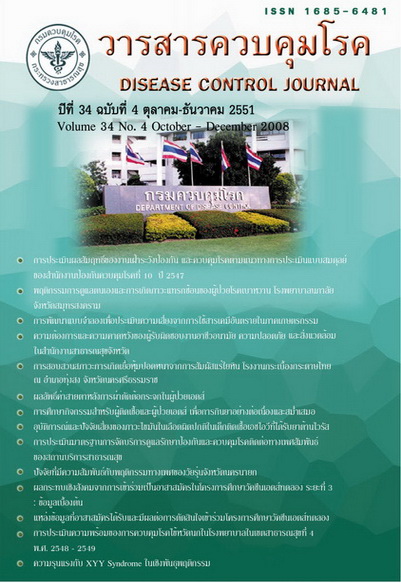The Study of Antiretroviral Drug Adherence Activities Providing for PLWHA
Keywords:
PLWA, Drug Adherence, Antiretroviral drugAbstract
This study was qualitative research on activities which strengthened antiretroviral drug adherence for PLWHA as provided by health care personnel working in hospitals together with people living with HIV/AIDS groups in North-East Region and Central Region (2 provinces/ region) during January – December 2006. In each province, health care personnel and people living with HIV/AIDS volunteer working in 2 targeting tertiary hospitals and 2 secondary hospitals were targeted population. The study found that activities arranged by health care personnel and people living with HIV/AIDS group consisted of counseling for care and treatment starting from HIV screening, counseling at the beginning of antiretroviral treatment, cases follow-up, group counseling for providing information, knowledge and understanding concerning with ARV, home visit including psycho-social support, in particular, setting peer to peer group up in hospitals. Peer to peer group was aimed to facilitate people living with HIV/AIDS to come and share information, knowledge and experience. Additionally, peers could help health care personnel to follow-up on ARV adherence including support and affordability of opportunity for work. Home visit by peerswas benefit for scaling-up of antiretroviral treatment adherence of people living with HIV/AIDS. Related health care personnel in many hospitals were willing to facilitate and support activities arranged by people living with HIV/AIDS group. Supportive environment in the work of volunteers were the improvement of capacity building by providing knowledge, information and skills needed for them, budget support, opportunities that offered them to help their friends with well collaboration of relevant partners. The important factors in the successful scaling up of antiretroviral treatment adherence were client's daily life, timely taking drug and disclosure of either negative or positive result of blood testing especially where people living with HIV/AIDS were stigmatized and discriminated.
Downloads
References
2. สำนักโรคเอดส์ วัณโรคและโรคติดต่อทางเพศสัมพันธ์ กรมควบคุมโรค.รายงานการประเมินผลโครงการการเข้าถึงบริการยาต้านไวรัสเอดส์ระดับชาติ สำหรับผู้ติดเชื้อและผู้ป่วยเอดส์(NAPHA) และโครงการปรับปรุงการเข้าถึงระบบบริการดูแลรักษาผู้ติดเชื้อเอชไอวี และผู้ป่วยเอดส์และการเข้าถึงบริการด้วยยาต้านไวรัส(Global Fund) :นนทบุรี; 2550.
3. คณะทำงานโครงการพัฒนารูปแบบการส่งเสริมการรับประทานยาต้านไวรัสอดส์อย่างต่อเนื่องสม่ำเสมอ สำหรับผู้ติดเชื้อและผู้ป่วยเอดส์. การส่งเสริมการรับประทานยาต้านไวรัสเอดส์อย่างต่อเนื่อง สม่ำเสมอ สำหรับผู้ติดเชื้อและผู้ป่วยเอดส์: โรงพิมพ์ชุมนุมสหกรณ์การเกษตรแห่งประเทศไทยจำกัด;2547.
4. เสาวคนธ์ อ่อนเกตุพล, กิตติกร นิลมานัต, และประณีต ส่งวัฒนา. ปัจจัยที่มีความสัมพันธ์ต่อความสม่ำเสมอในการรับประทานยาต้านไวรัสของผู้ติดเชื่อเอชไอวี/ผู้ป่วยเอดส์. วารสารโรคเอดส์.2549;19;48-62.
5. Weishut DJ. Coping with AIDS in a support group - an encounter with the health system. Harefuah 1996 ; 130(8) : 521-3; 583.
6. Weishut DJ. Encounters with the Israel : Health Service : impressions from a support group for people with HIV. AIDS Care 1997 ; 9(4) : 481-6.
7. Fontaine KR.,Mckenna L.,Cheskin LJ. Support group membership and perceptions of control over health in HIV+ men. J Clin Psychol 1997 ; 53(3) : 249-52.
8. รัตนา มุขธระโกษา. ความคิด ความรู้สึกและพฤติกรรมของผู้ติดเชื้อเอดส์ในโรงพยาบาลจุฬาลงกรณ์. คณะพัฒนาสังคม สถาบันบัณฑิตพัฒนบริหารศาสตร์, 2538.
9. ศันสนีย์ สมิตะเกษตริน. การศึกษาสุขภาพจิตของผู้ติดเชื้อ ผู้ป่วยเอดส์ที่เข้าชมรมผู้ติดเชื้อ. 2542 (เอกสารอัดสำเนา)
10. ศันสนีย์ สมิตะเกษตริน(บรรณาธิการ). การสำรวจข้อมูลกิจกรรมกลุ่มผู้ติดเชื้อเอดส์ในประเทศไทย ปี 2542 - 2543 :โรงพิมพ์ เจเอสการพิมพ์; 2543.
11. โกมาตร จึงเสถียรทรัพย์(บรรณาธิการ). มิติสุขภาพกระบวนทัศน์ใหม่เพื่อสร้างสังคมแห่งสุขภาวะ: สถาบันวิจัยระบบสาธารณสุข;2545.
Downloads
Published
How to Cite
Issue
Section
License
Articles published in the Disease Control Journal are considered as academic work, research or analysis of the personal opinion of the authors, not the opinion of the Thailand Department of Disease Control or editorial team. The authors must be responsible for their articles.






